#i guess is what i’m getting at
Explore tagged Tumblr posts
Text

more lesbingqiu lol
they have a scheduled cuddle time where sqq gets to rant about the novel she’s reading and Binghe gets to stare at her while going insane. And then they kiss <3
Binghe is very normal about her wife 🥰
Here’s the doodles from Binghe’s thought bubble. I thought they were silly :]

#I don’t know why I’m only capable of drawing them fem#I always set out to draw them normally and then go “but u know what would make this BETTER”#they’d be both better and worse as lesbians#Also I get to draw pretty women so that’s a plus :)#I think about them a very normal amount#svsss#my art#digital art#svsss fanart#mxtx svsss#shen qingqiu#shen yuan#luo binghe#luo bingge#i guess#bingqiu#lesbingqiu#scum villian self saving system#scum villain#fem binghe#fem shen qingqiu
1K notes
·
View notes
Text
Okay can I be a bitter Anders fan for like. Just 2 minutes here lmao
Cause bioware released some game stats for veilguard and apparently 72% of players redeemed Solas which is like. Okay yeah the game kinda pushes you towards that. But when I think of all the shit I used to have to put up with just for enjoying Anders like at all and…
(This is not me being anti-Solas, I do not care if you love or hate him, but I am gonna say what he’s done is like. Objectively worse than literally every other companion so lmao. And that’s fine! You can still enjoy him! I’m not saying you can’t and it’s important to me that people understand that! I’m just saying he did in fact do objectively morally worse things in game than Anders did and I don’t think that’s really debatable. And I can’t really make my point here without saying that but I do want to make it clear this is not some moral condemnation of Solas enjoyers cause it’s not)
Getting anon hate on the regular, being told “oh you’re allowed to like Anders as long as you regularly talk about how much he sucks”, people gleefully describing how much fun they have killing him ON your posts about the fact that you like him, the devs making jokes about shitty fates for him when fans asked innocent questions about him, the absolute audacity of his writer to say half the shit she did in interviews (about bisexuality and mental illness, most critically), and then being beaten over the head again in inquisition about how Anders is the worst character to ever exist and there’s no redemption for terrorists who lie to you one time in the entire game and he deserves death or worse and that’s it
And now… 72% of people are down to redeem the guy who lies to you for 2 games straight and who did a lot of questionable things that includes creating the fucking blight and. Like. I guess I’m glad that Solas fans can live in a world where they aren’t constantly harassed and can give their ship like. A pretty damn good ending all things considered. And that the devs love Solas and actually give the option for that happy ending and have characters go to bat for Solas throughout the game and the most annoying thing they have to see are people making scrambled egg memes. I would not wish anyone to have to deal with the shit Anders fans had to put up with back then cause it sucked. It really sucked. And I’m glad it’s not being repeated with a different character, if nothing else
But like. Man there really is a difference when the writers actually like the character who does the thing, huh
#shut up nerd#anders#I’m sorry it’s just. really hard to not be bitter tbh#like the shit we as fans went through#just for liking a damn character#tbf I do actually think if the game came out today perceptions would be different#I think people would be more comfortable with revolutionary action now than they were then#but even still#it’s not even about that you know#it’s about people (both fans and at times the actual devs) being mean when they really didn’t need to be#and the DA trenches are probably why literally no harassment phases me anymore lmao but#that’s not a good thing slskd it’s just a useful consequence I guess#so yeah idk#am I jealous that Solas fans get to have a better experience?#yeah I can’t deny I feel a bit of that#but I’m also just. idk tired and sad for what that time was. and also glad that it seems to be over#but also a little bitter that I had to go through it when it didn’t need to happen at all#idk just feeling a lot here in this chili’s tonight lmao#(why do I say that I don’t think my country even has chili’s)#ANYWAY#dragon age#veilguard spoilers
800 notes
·
View notes
Text

Sometimes a day makes you want a Starscream to bite and squeeze
#guess who got their final scores back ahaaa#class avg was 60 percent 😭#also I have blocked the transformers tag on TikTok that place is a hellhole#bit of a vent here but it’s so crazy#I was talking to a person I didn’t even follow a while back and we were making jokes like yeah the autobots ship megastar#on my fyp a couple days later and I see them reposting “shipping megastar is bad and gross’ like bruh what#I saw one of my followers commenting ‘yeah can’t believe it’s so popular’ I HAVE POSTED MEGASTAR BEFORE WHAT ARE YOU DOING HERE#I POSTED MY STARSCREAM AND MEGATRON FIGURES RAILING EACH OTHER#I only started posting cause I was like eh if it’s getting banned might as well#these people were poisoning my fyp smh#I’m convinced it’s just a moral superiority thing like all of those people who thought abo was so cringe and then someone was like#‘I secretly like abo’ and everyone agreed that they also like abo and it’s not that weird anymore#Ngl though. it is kinda sad but also kinda funny#sorry for the rant cause I talked about it before and I don’t want to keep on talking about it but those two baffled me#transformers#transformers fanart#megastar#megatron#starscream#transformers g1#megascream#maccadam#its like watching one of those religious couples where one of them is gay and theyre like 'I am working through my gay to be straight'
666 notes
·
View notes
Text
one thing that drives me absolutely insane is that ive seen so many comments talking about how tvpjo!annabeth isnt their annabeth bc shes not tan and blonde but i dont see people complaining about literally anyone else!! there are SO FEW characters if at all that stay faithful to their book descriptions! luke isnt a blonde guy, percy doesnt have black hair and green eyes, grover doesnt have a rasta cap on, chirons horse end is black not white, echidna is NOTTT supposed to be a conventionally attractive older woman i could keep GOING.
at the end of the day these people are portraying these characters essences incredibly, and this tv series is by far one of the best adaptations ive ever seen of any popular book. to take that for granted and complain because of different hair and skin, especially singling out ONE twelve year old girl is so childish and frankly! disgusting.
#so i guess what I’m saying is GET WRECKED#ill protect these kids with my life theyre KIDS#also theyre fantastic and i love their portrayals#theyre the trio brought to life its so COOL#pjo#percy jackson#annabeth chase#percy jackson and the olympians#pjo tv series#luke castellan#grover underwood#pjo tv show
3K notes
·
View notes
Note
Holy shit I love your Dirk interpretations, it's so true and I could talk about this shit forever. I feel like another part of his character that people seem to forget (along with Roxy for some reason) is that he's from the future in solitude in an apocalyptic wasteland. I just see that part of his character always removed which is disappointing because I feel like that's a pretty big part, especially regarding his themes around technology, his brother's theme of Time, his own isolation, and how he plays in the vastness of the universe and spacetime.
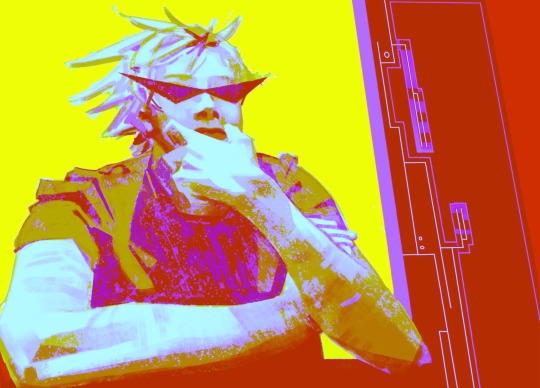
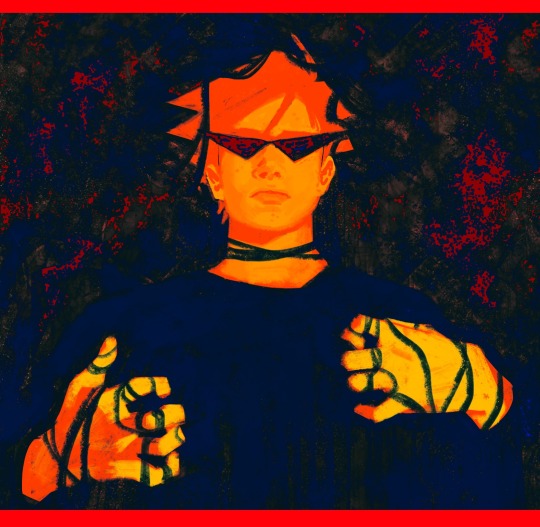
Art I drew related to the subject because I like to respond to asks with art.
But absolutely. I certainly understand where the lack of discussion over his isolation + upbringing comes from, considering a majority of the fanbase that I have seen builds their ideas based on their own version of postcanon. I’m not entirely sure how that would be fixed, but certainly even in the somewhat recent past I would see a lot more content regarding his upbringing both literally and symbolically. I don’t have much to add regarding the things you’ve mentioned, because they just are what they are. Dirk being confined to a singular room left to him by a father figure he never met, in a future where the only other person left on the planet is someone he cannot pursue a relationship of because of himself, with purely 3 robots to keep him companion, one being an exact replica of his own brain who is *also* trapped inside a pair of glasses, is about as literal as it gets to me.
The contrast to me involving the flooded, organic world in comparison to the little speckle of Dirk’s apartment packed with the dude and his technics is not only a representation of his isolation and entrapment within himself, but also of his lack of control. I think his obsession with & themes of control are a direct product in the case of Dirk specifically *of* this kind of upbringing. His themes of technology are also related to his themes around control. So much of his character is actually revolved around this to me like so much. Dirk is so deeply disconnected from humanity in every way and so much of his character + symbolism is based around that.
It doesn’t even have to be about the symbolism or anything though. It’s just pretty *interesting* in the literal sense that he lives in the middle of the ocean in the future. There’s not only a lot to theorise on to do with his young life there, but on how it might affect him in the way he acts for the rest of his life. The latter part is probably what I see mentioned the most by people talking about Dirk regarding this, I’m surprised I don’t see more discussion on the former too though. I really ought to actually talk more about Homestuck stuff on here. I will do it myself.
Roxy & Dirk’s relationship is largely ignored though because there is a narrative a certain demographic spreads that Dirk resented and blamed Roxy for her interest in him, and thus too many people believe that their relationship was or would continue to be an abusive one. Realistically, I believe it’s important to acknowledge that the way Roxy treated Dirk regarding his homosexuality wasn’t right while still acknowledging the obvious amount of respect and admiration Dirk had for Roxy. I mean we have a huge piece of dialogue from their post trickster mode conversations on the quest beds from Dirk purely stating how he feels about Roxy that people completely ignore somehow. I think this usually happens to characters that are women though. I know everyone says it, but it is true. Jane gets the exact same treatment of boiling her down to solely her negative aspects. The things I see completely mischaracterising both of them are horrific.



I mean how much more explicit can it get that their relationship is obviously very important to Dirk? But I digress. I think the best or I should say “most interesting” interpretations of their relationship usually come from DirkRoxy shippers actually.
I would be interested to hear about Dirk’s relation to his brother’s theme of time though. I don’t have any thoughts on this and I don’t recall ever hearing anyone talk about it before. If you or anyone else would be willing to enlighten me I’d be thrilled.
#homestuck#homestuck fanart#hs fanart#dirk strider#blooby posting#ask#Sorry for taking so long to reply to you on this. I’ve been in more of a drawing than a speaking mood lately#which is very unusual for me. This is definitely not as much of a post as it could be but I’m still not back on my thought and speech game#I know the Roxy mention was in brackets but good lord the treatment Roxy gets from fanbase is insane. Couldn’t help myself#Sorry if anything is worded badly. I’m tired per usual#I think (with no malice in my heart) people just tend to leave out what they don’t like about characters though.#I was very briefly talking with Pomme johnegbertirl#and it got me thinking about how far a lot of people’s interpretations of characters stray from what would be realistic to canon#based on their own biases. Which I guess I probably do too to a certain degree.#I’m not one to judge people for their characterisations at all#I tend to be very forgiving when it comes to reads#but… I admit that is indeed a little disappointing to see how completely ignored some parts of his characters are.#Sorry for tangent that is tenuously related. It is relevant enough to shove haphazardly into tags#I’m glad you like my Dirk ramblings though. Thanks brother#We live on
886 notes
·
View notes
Text

FINALLY breaking myself free from the chains that are rendered Fords… STANLEY, MY LOVE, I AM HERE TO AT LAST APPRECIATE YOUR FACE HOW IT DESERVES!!!!!
#my art stuff#digital art#stanley pines#gravity falls#sea grunks#grunkle stan#beanie#mullet#his poor Pines Curls have gotten so thinned out after all these years#FORD GIVE HIM SOME BACK - HE DESERVES THEM!!!!!#very happy with this - he looks so very handsome with a smile 🥺🥺🥺#OH and OBVIOUSLY giving him back his freckles (even if they may have been exaggerated in the memory by his own view of himself)#we deserve more sea grunks Stanley and HE deserves more KISSES#Despite liking how it turned out - It suddenly struck me I’m very repetitive with this lighting#I know some might argue it’s just becoming my brand#but I’m worried it’s getting worn-out and boring for y’all to look at#I don’t feel very creative flexing my strong suit when I always do it the same way#I guess that’s just what happens when said strong suit is shading with “realistic” lighting
316 notes
·
View notes
Text
Finarfin Fades.
No one expects it, no one’s faded in Valinor since Miriel. The War of Wrath is won and he comes back, waving off the courtiers, well wishers, and congratulators with his usual grace, and walks into the palace of Tirion. To rooms abandoned since their owners left so long ago. Winding deeper and deeper his feet take him to what was once Finwë’s favourite garden.
He’s so tired.
He’s fulfilled his promise to Fëanaro and Nolofinwë, to avenge them. To make the agony of their final moments - agony Finarfin felt, falling to the floor screaming as fire and darkness consumed his spirit - count for something. Now Morgoth is finally gone, but he’s not the only one.
His brothers, larger than life, larger than death, are gone. With them his sons. Niece. Nephews. Grandchildren. His daughter is never to return. He Saw little Nelyo’s death in his dreams and is sure hopes for the child’s own sake that Makalaurë will be close behind.
Little remains. Even less on these golden shores.
So Finarfin sits on a bench long overgrown with vines and weeds, and watches the sun filter through the thicket, wishing the ghosts he sees in his father’s garden would flesh out.
He sits. He waits.
And by the time anyone finds him, it’s too late.
…at least he’s smiling again.
#au i guess#Every so often I’m hit with Finarfin feels#and it *hurts*#we love Finarfin in this house#my poor guy deserved better#I know Finrod is reembodied but let’s say it would’ve happened after the war#the Valar didn’t expect this though#and they can’t make it better#Finarfin’s lost too much and he’s tired#tired like his half-brother’s mother#and they know he won’t return until his brothers are let out#maybe that’s what finally convinced them to let out Fëanor and Fingolfin#they’re waiting in the Halls btw#the whole fam is#they’re proud#and Arafinwë finally gets some rest#Finarfin#Arafinwë#war of wrath#fëanor#fingolfin#they’re haunting this whole thing#you can decide where Eärwen is in all this#I usually hc her as having stayed with her husband but maybe she leaves in this one#or maybe she’s gone for a few weeks trying to settle the new arrivals before heading back#not my best work but alas#midnight writings yanno#silmarillion#ITHOF Writes
433 notes
·
View notes
Text
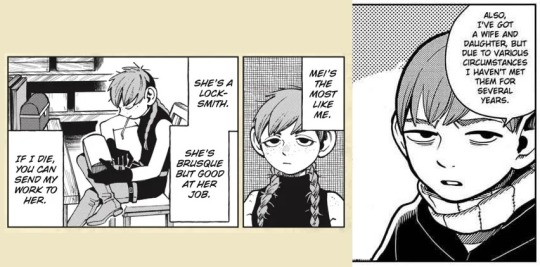
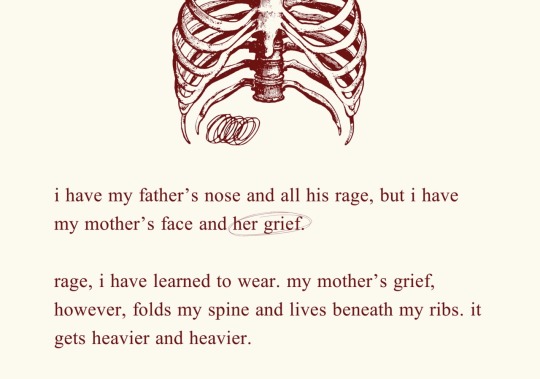

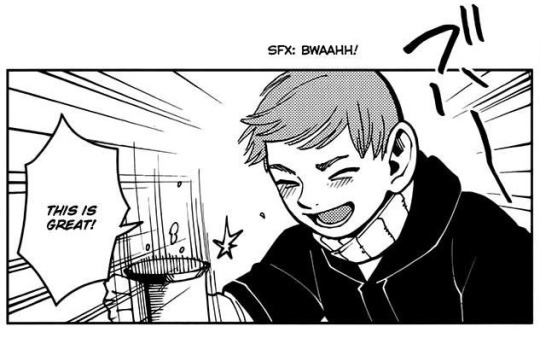
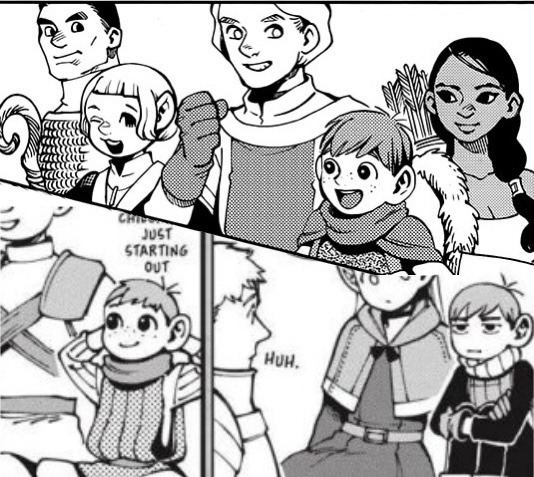
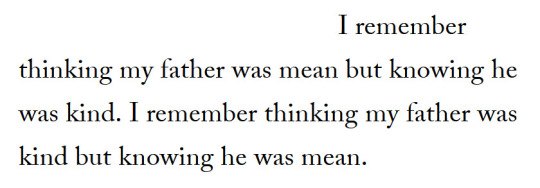
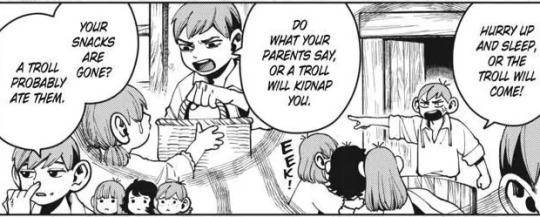


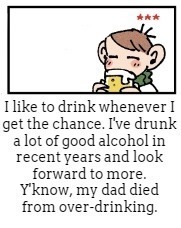
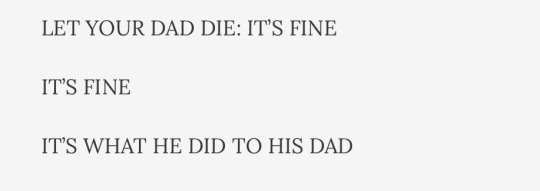
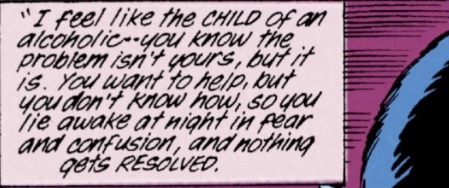

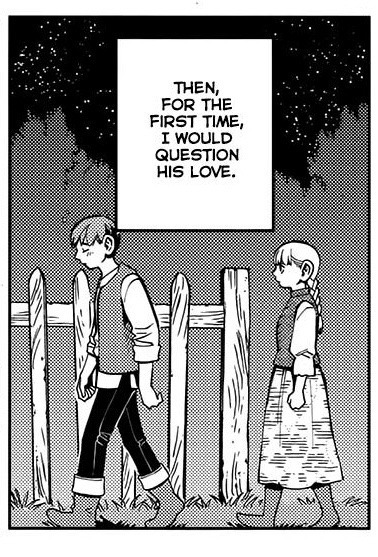
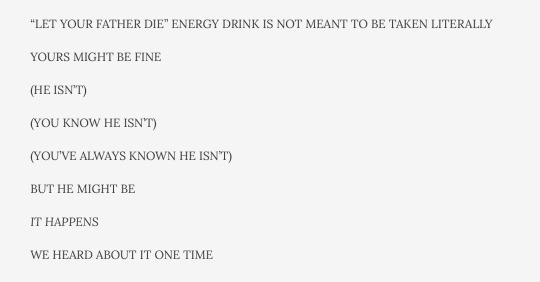

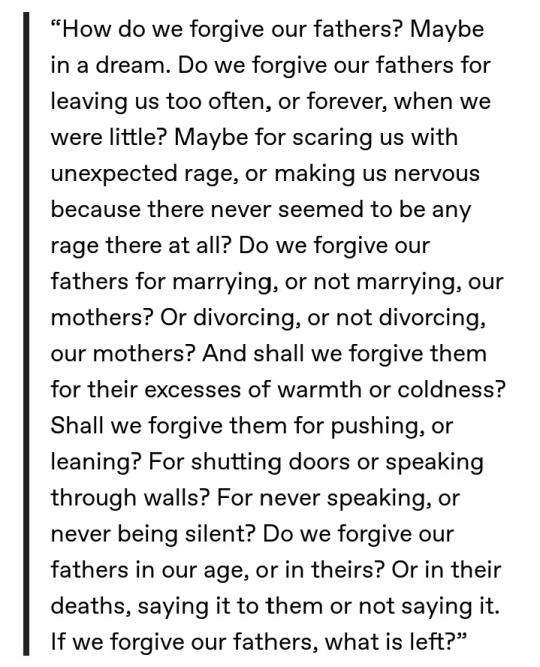
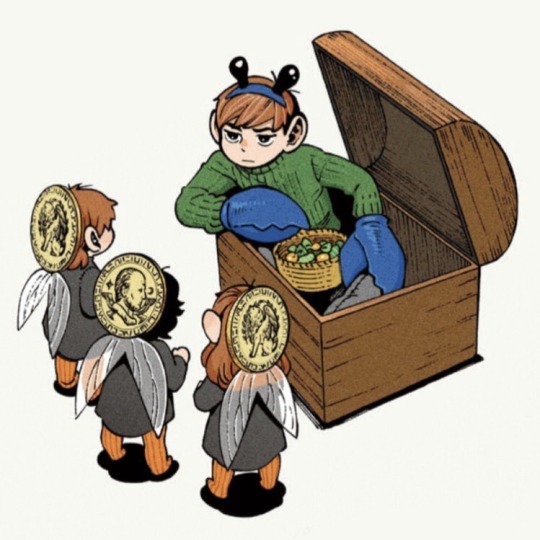

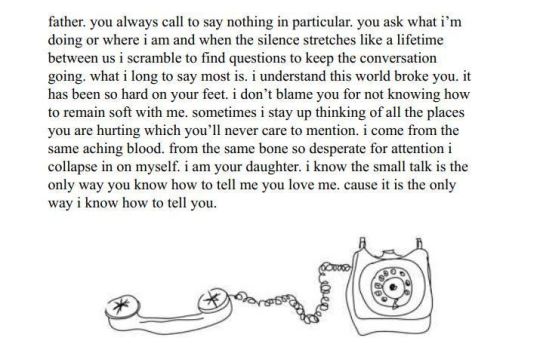
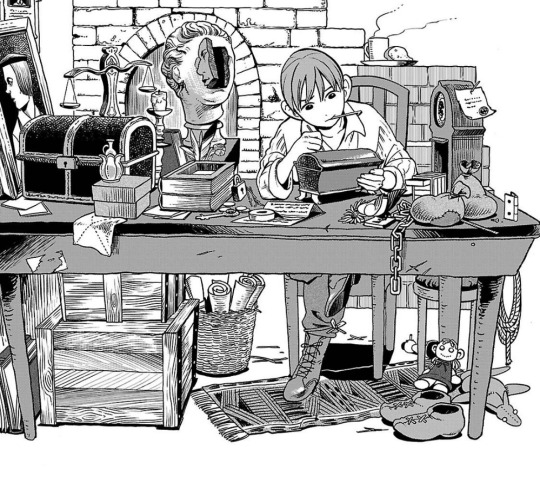
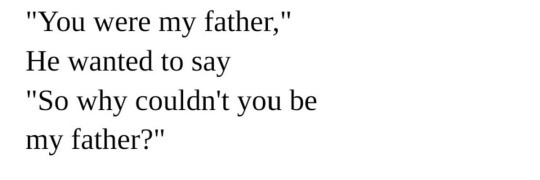
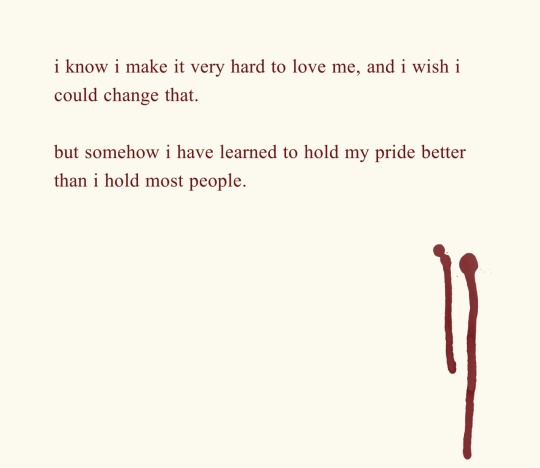


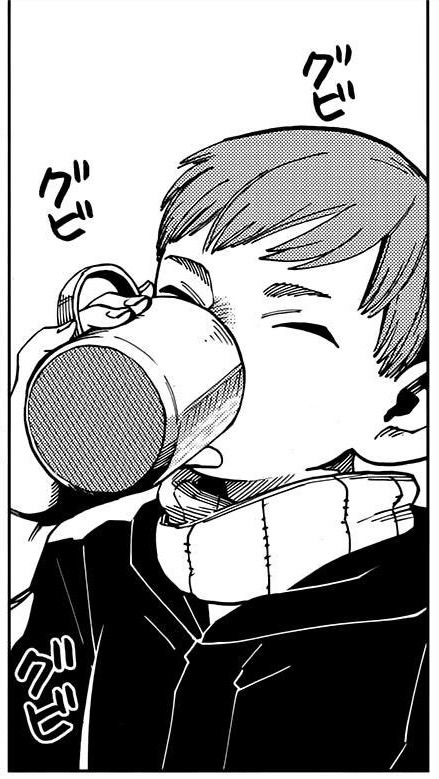

Dad always said I was like him
Meijack and Chilchuck Tims Dungeon Meshi, Ryoko Kui
^ 1: Moony moonless sky, Fatima Aamer Bilal / 2: Bug like an angel, Mitski / 3: Woodtangle, Mary Ruefle / 4: The Third Hour of the Night, Frank Bidart / 5 & 6: FROM THE MAKERS OF "TWO-MOM ENERGY DRINK," IT'S "LET YOUR FATHER DIE ENERGY DRINK,", Daniel Lavery & Cecilia Corrigan / 7: Batman: Year Three (1989) / 8 & 9 : FROM THE MAKERS OF […], Daniel Lavery & Cecilia Corrigan / 10: Wilt, CJ the X / 11: How Do We Forgive Our Fathers, Dick Lourie / 12: Milk and honey, Rupi Kaur / 13: And My Father's Love Was Nothing Next To God's Will, Amatullah Bourdon / 14: Moony moonless sky, Fatima Aamer Bilal / 15: Someday I’ll Love Ocean Vuong, Ocean Vuong / 16: untitled, Joan Tierney v 17: Drunk, The Living Tombstone / 18: unknown
When your father tried his best to provide for you but he worked all the time and even when he was home he was either tired or stressed and he’s always liked to get drunk to relax and cheer up. When you know he values work ethics and respectability so you grew up to be capable and quiet. And when he says you’re like him you’re sort of puzzled, does he really know you so little, or does he know himself so little? But you like the feeling of your father ruffling your hair so you accept it, and still you stand next to your mother just as silent and just as stoic as her during family gatherings. He leaves again and again and when your mother leaves him nothing changes, really. You wonder if it’s more telling that you know him better than he seems to himself or that you don’t know him as much as you wish you did, or that you don’t think about him all that much these days. Out of sight, out of mind. And he’s never really been there, even when he was there, after all.
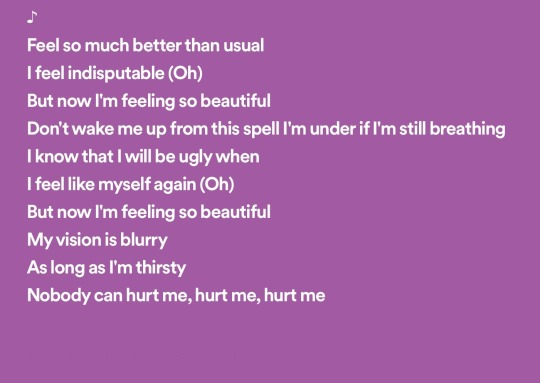
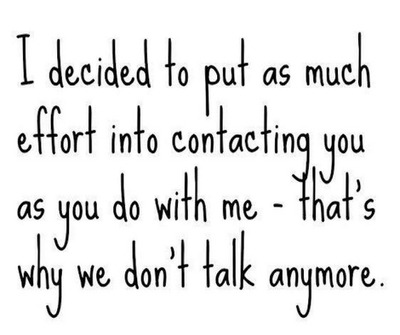
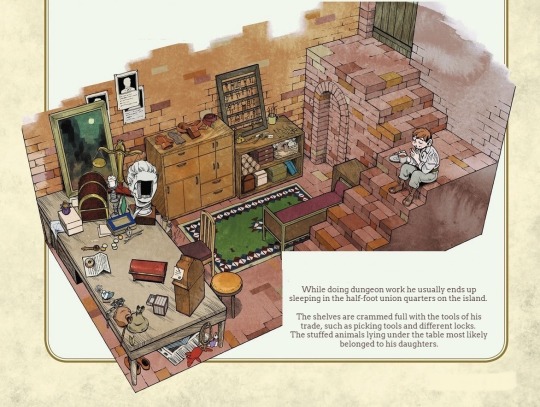
#It’s ok they do get in touch again and he prob at least lives to 40#Alright I’m ready to be normal about chilchuck again#Spoilers#I guess?#dungeon meshi#chilchuck tims#meijack#chilchuck’s family#meijack chils#Web weaving#alcoholism#cw alcohol#webweave#A couple more i liked are like a rearview mirror we’re not as close as we appear line and this french one from#Kristina Gauthier-Landry that goes like hands full of trout running up to you / look what i caught look / how much you love me#And this other one about chocolate coins that a dad arriving from work in middle of the night gives the happy little daughter running up#And it’s so anticlimatic and about transactional relationships and oughh ough it’s a good book#I am Chil is a complex absentee father truther sorry. Idc go see my analyses if you want don’t argue w me here#posts for which i am the target audience#Oh oh another one : So were we close? Or was it just the big things that held us together and the small things that let us fall apart?#The word father rotted in my mouth#Bc it’s left there to rot get it get it………..#Sigh. Like father alike daughter#I’m a truther that she’s more like her mom demeanor wise
483 notes
·
View notes
Text

save me tattooed dan save me
(non tattooed version bc Arms and also this entire piece was inspired by this tweet x so i should probs make the top easier to see)

#bro those tattoos took like 2 days for me to figure out sketch line then paint THEN readjust everything bc i suddenly remembered dil exists#i know this is going to flop dismally but i mainly did it for me bc i’m too disabled to tattoo so i’m living vicariously through myself#by just#drawing tattoos on people i guess#sigh#also took so long bc the atrophying is getting rlly bad but can’t do anything abt that so#slow and steady wins the race🙂↕️#what references can u recognise.. every tattoo has a meaning..#i was annoyed i finally started getting ideas after everything was in place so i couldn’t fit the microwave which is sad#but there’s still others !!#yes even the flowers have meanings :33c#art2 and craft2#phanart#daniel howell#dan howell#dan and phil#dnp
233 notes
·
View notes
Text
the fandom’s characterization of peri becoming a father to dev will always be interesting to me because where it did it even come from ???
I mean in operation birthday takeback, bro CLEARLY did not care. He honestly seemed so disinterested and didn’t even care when they went into his dad’s private office by accident. He didn’t seem care or smile for his godkid when he was happy. Even got a little mean when Hazel made a nice wish for him with the rocket boots (“Well that should keep him entertained for about 10 minutes” or smth like that)
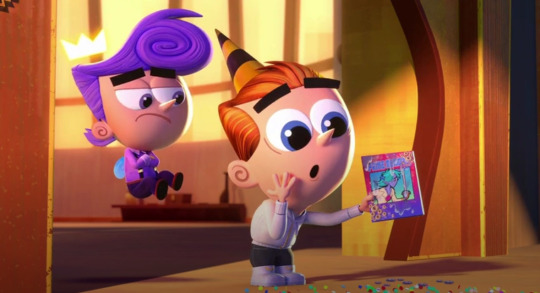
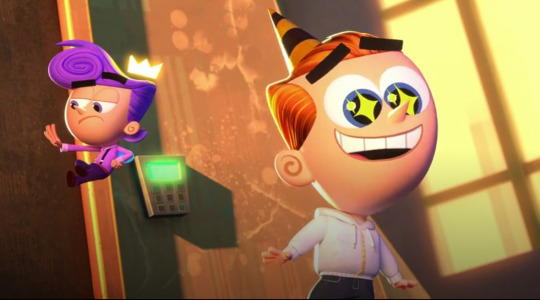
Lost in Fairy World he didn’t really seem to care either??? he really only just wanted his wand and to ‘look good’ in front of his godkid and do things his way without his parents interfering. Sort of like how a babysitter wants to look good in front of the family of the kid they’re looking after if that makes sense.
The only time we ever seen him actually care about dev was in the finale when he said that. But even after fairy world got turned to normal he didn’t really seem sad about dev??? he was just smiling after, seemed genuine too and not a fake one. Maybe it’s just me, but if I was a fairy and lost my first godkid, who took over my home, I would be doing anything BUT smiling, even if we won in the end. Peri doesn’t seem like one to hide his emotions easily either (maybe I’m reading into his character wrong)
You could bring up best of luck, which I would say is a fair point, but I’m going to bring back the babysitter/job synonym. Wouldn’t you get jealous of the person that stole your position or place in a work environment after you got fired?? Especially if your rival/enemy took that position?? I PERSONALLY don’t think the jealousy comes from a place of care, but maybe that’s just me.
It could honestly just be the fandom’s way of coping since Dev doesn’t seem to have any good people in his life after the finale, but why Peri? I mean if you really want to make one of the fairies a father figure to dev, I’d say the anti fairies more over are his family but that’s IF we have to choose.
Don’t get me wrong, I do think all of the peri and dev being a father son duo is super cute and heartwarming!! I love seeing all of the art and fics of that because it really is sweet :3 but to me, it just doesn’t really make sense and seems more out of character for Peri if anything.
He seems to care more about following Da Rules in my opinion. And while I do think it’s important to follow rules, especially when it comes to a job, you shouldn’t rely on them. At a job, you shouldn’t be constantly looking over rules to make sure you’re following them, you might end up tripping over yourself. That’s what Peri ended up doing.
If I assign the duo as anything, it would be the tired babysitter who just wants to get paid and the kid he’s looking after. A dude working a 9-5 at his job he couldn’t really care less about (dev).
I mean (only from his words) he wanted to go into the family business. Not because he genuinely cares for kids, but because it’s what his family has done. He’s treating godparenting as work, not stepping into a kids family and genuinely looking after them.
I do wonder if he would act the same way if he had an easier godkid.
BUT!!!! that’s just my thoughts. I’m sorry if I got anything wrong and feel me to correct me if I did !! Also if you disagree with anything that I’m saying, tell me why in either the replies or reblogs !! I would love to hear other people’s perspectives or opinions.
That’s it 😨 thank you so much for coming to another yap session and I hope you have a great day/night wherever you are in the world <3
#shoutout to tumblr user raccoonnutella13 for inspiring me to write this post#idk whether to tag you or not#fop a new wish#fop new wish#fopanw#fop anw#fairly oddparents a new wish#fairly odd parents a new wish#greenlightfopanws2#dev dimmadome#periwinkle fairywinkle cosma#fop peri#peri fairly oddparents#peri cosma#fop dev#dishie posts#fop#fairly oddparents#just screaming into the void here I guess#please tell me someone gets what I’m saying#really long post#sorry about that#development devin dimmadome#hot take ???#maybe
221 notes
·
View notes
Text
For anyone who likes romance and spies and yearning and a short king being completely head over heels for a woman that can (and does) kick his ass, Argylle is the movie for you. Feel like the marketing team is leaving money on the table by not appealing to the romance crowd that is crying out for more genuine love stories on film and the one in this movie is actually really sweet and features an attractive couple with actual personalities.
#argylle#argylle spoilers#i am notoriously harsh on m/f couples in film especially modern ones#but i really liked this one and loved how it felt like a real partnership#this movie is not gonna win any awards but it’s very cute and the action was fun#and bryce dallas howard getting to play a whole woman instead of a terrible string of misogynistic cliches in Jurassic World was refreshing#plus sam rockwell >>>>>>>>>>>>>>>>>>> chris pratt any day#i guess he’s only a ‘short king’ in comparison to other guys but you know what he’s basically an inch taller than bryce dallas howard#so i’m letting him keep the epithet especially since the other guys are much taller and more built
744 notes
·
View notes
Text
Hello fnc nation,,, I come bearing offerings



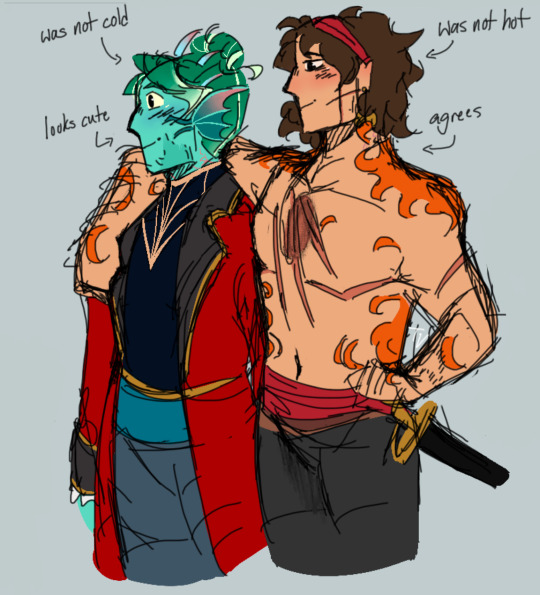

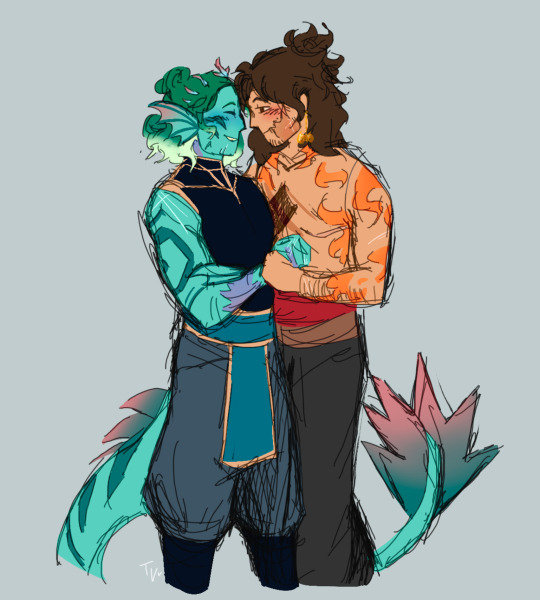
#jrwi riptide#just roll with it riptide#gillion tidestrider#chip jrwi#chip nolastname#jrwi fnc#jrwi fish and chips#just roll with it spoilers#jrwi riptide spoilers#riptide spoilers#I’m going to slink back into the darkness now#unless you like. wanna talk to me about them haha what.#I want to make more riptide pals… come speak to me#some of these are from during my first watch through so pardon the old designs? I guess??#dunno why I get so nervous sharing shippy stuff#actually I do know#I’m from p0kem0n lmao#TV’s art
479 notes
·
View notes
Text
Finally… after 2-3 months of working on this…
it’s finally done!!! I can finally sleep in peace now-
To give context: Mickey went to the Realm of Darkness to search for Oswald (cause he figured out he was still alive and such, don’t know how). And later he found him, but not the same brother as he knew before… (and then they proceeded to have a 3 and a half minute musical because it’s what every Disney characters do sjfjsjdk-)
Anyways enjoy! This was really fun, yet challenging project to do considering this is my first animatic haha! ☀��✨
(Animatic inspired by Frootoon on YouTube btw! Just wanna give credit is all)
#my art#art#kingdom hearts#kingdom hearts 3#my animatic#mickey mouse#oswald the lucky rabbit#king mickey#anti-Oswald AU?#eh I’ll add it why not#holy cheesewheels how the heck did I do this???-#I guess all this really did paid off haha!#even tho there were some mistakes#but I’m not gonna get too picky on it#anyway let me know what y’all think!#rapunzels tangled adventure#tangled the series
304 notes
·
View notes
Text
They make love out there in the field, before David has to leave for good. It’s fast and messy, with both of their emotions running so high. Yonatan comes with the taste of David’s tears on his tongue.
He stays lying on his back in the grass until the sound of crunching footsteps finally fades away, and only realizes later that, in their utter desperation for each other, he’d forgotten to take any of the usual precautions. But by then, it’s far too late.
***
Four months later, he goes to see David at Horesh. Even in the dim light of the hideout, David looks at him oddly.
“Something’s different about you,” he muses, and Yonatan has to stop himself from reflexively clutching his belly. He’s not showing yet, not really, but he can feel the life growing inside him.
He expects David to approach him then, to explore the planes of his body as he’s done countless times before. He readies himself to tell David the truth, to finally feel the weight of this secret lift off his shoulders. But David comes no closer. He eyes him for another moment and then turns away, pulling out a large map of the Judean territories as he updates Yonatan on his group’s movements over the last few months.
It’s better this way, Yonatan decides. David has enough to worry about at the moment without concerning himself with Yonatan’s health, and there’s no guarantee that the baby will make it to term anyways: it’s not as if Yonatan is willing – or able – to confine himself to bedrest for nine months. When David returns to Giveah, Yonatan can reevaluate the situation. Most likely Yonatan will never need to reveal his mistake; best case scenario, David will have an heir to secure his lineage as he ascends to the throne.
***
Years later, as Yonatan lies bleeding out under the stars, his last thought is to wish he’d gotten the chance to tell David about their son.
#david x jonathan#jonathan x david#david/jonathan#bible fanfiction#king david#david and jonathan#bible fandom#cw mpreg#I don’t know!!! I don’t know#I told yall it was gonna be angsty#ok so I have a second chapter that’s also really angsty but with like… a bit of a happy ending ig? if you know the canon you can probs guess#but I wrote this bit and just wanted to post it cuz I think it stands on its own merits tbh lol haha tehehe#also I wrote this at work today cuz I’m cool like that#(can I tell yall a secret… if I hadn’t been writing at work I probably would’ve left it as ‘fuck’ instead of ‘make love’ in the first line#(not because anyone can actually see what I’m doing but I’m just too embarrassed to write really dirty stuff on my work computer 😭😭)#also JUST FOR THE RECORD. IN CASE ANYONE GETS THE WRONG IDEA. THIS IS TRANS!YONATAN NOT OMEGAVERSE#sorry that I keep talking about pregnancy in a totally non sexy way. hot take but I just don’t find pregnancy stuff sexy literally at all 😫😫
117 notes
·
View notes
Text
Btw this is a safe space for people who are pissed off that Luke was omitted by the SAG nominations.
I’m disappointed but not surprised. Unfortunately.
#one day I guess#I’m happy for Nic but like… yeah#but also I don’t wanna get into the whole „his PR team sucks’’ bit#because I’m not sure I agree#I think it’s more that people prefer to focus on the darling girl Nic#it is what it is and all that jazz#luke newton#also please don’t send me hate
100 notes
·
View notes
Text



Hello, finally made reference sheets for Tidally Locked au. I also changed Narinder’s design a little bit, I didn’t like how the first one’s coloring came out. Sorry if my handwriting is bad
#narilamb#tidally locked au#cotl narinder#cotl lamb#cult of the lamb#cotl fanart#cult of the lamb fanart#cotl narilamb#cotl#my art#tw blood#tw cannibalism#i guess#narinder always at the scene of the crime istg#sirender#hi gang I’m going nuts rn#btw fun fact lamb being a vegetarian is based on me being a vegetarian irl (I can’t digest meat lol)#‘why do you draw Narinder so big??’ GET OUT OF MY HOUSE#‘’’’’for scale’’’’’#what who said thay
165 notes
·
View notes